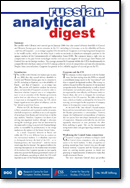Russian Territorial Reform

A Centralist Project that Could End Up Fostering Decentralization?
Author(s): Julia Kusznir
Editor(s): Jeronim Perovic, Robert Orttung, Matthias Neumann, Heiko Pleines, Hans-Henning Schröder
Series: Russian Analytical Digest (RAD)
Issue: 43
Pages: 8-11
Publisher(s): Center for Security Studies (CSS), ETH Zurich; Research Centre for East European Studies, University of Bremen
Publication Year: 2008
